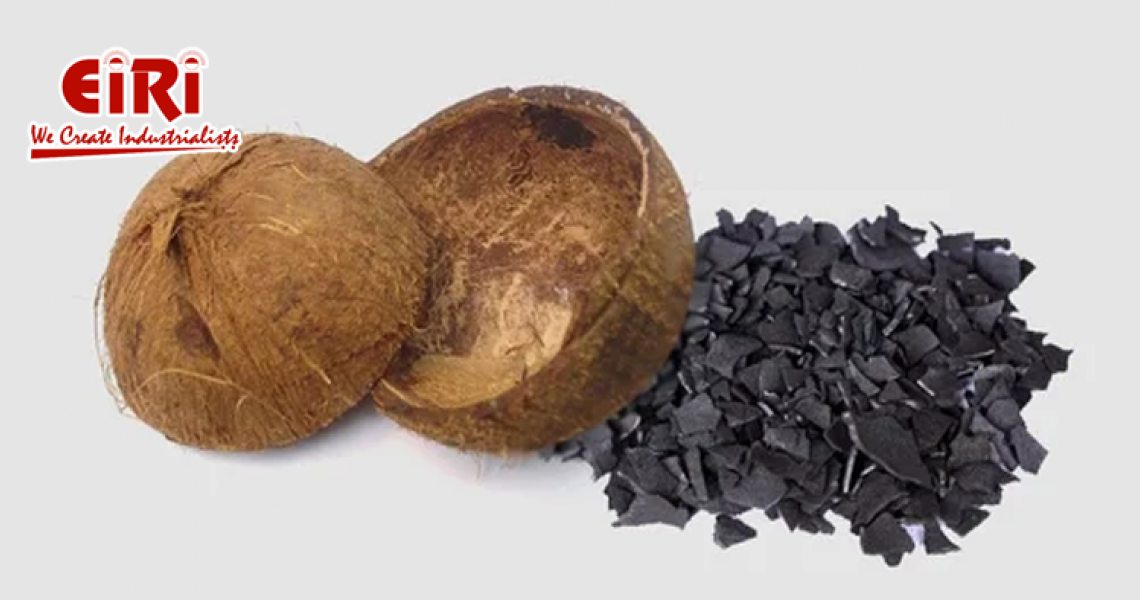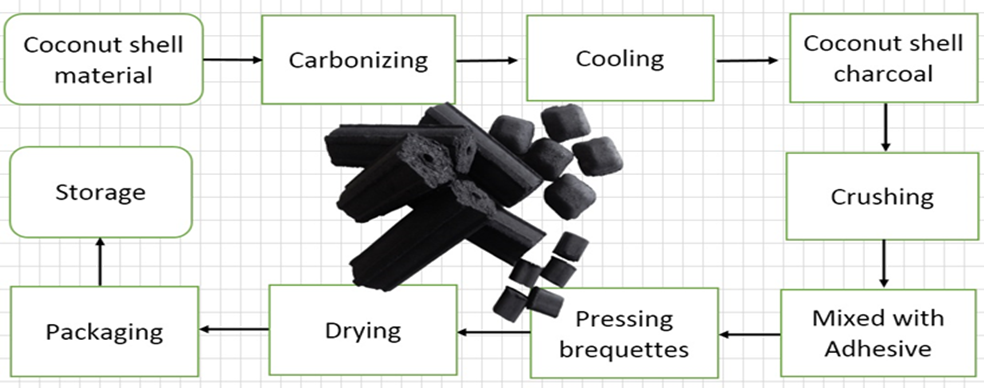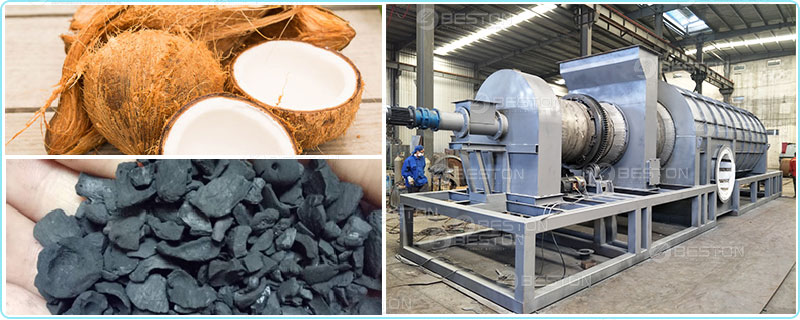Coconut Shell Charcoal Manufacturing: From Nature's Waste to Valuable Resource

Coconut shell charcoal is a sustainable and versatile natural resource that has gained significant popularity in recent years due to its eco-friendly properties and diverse applications. The process of manufacturing coconut shell charcoal involves transforming discarded coconut shells into high-quality charcoal, making it an excellent example of waste-to-value utilization.
The manufacturing process of coconut shell charcoal is a multi-step journey that begins with sourcing coconut shells from various agricultural industries. These shells, which would otherwise be considered waste, are collected and processed to extract the valuable charcoal.
The first crucial step in the coconut shell charcoal production is carbonization. During this process, the coconut shells undergo controlled heating in an oxygen-limited environment. This results in the removal of moisture and volatile components, leaving behind pure carbon content. The carbonization process plays a pivotal role in determining the quality and properties of the final charcoal product.

After carbonization, the coconut shell charcoal is further processed to obtain different forms suitable for diverse applications. Manufacturers utilize various techniques to create charcoal briquettes, granules, or activated charcoal. Each form possesses distinct characteristics, making them suitable for a wide range of industries and uses.
Coconut shell charcoal's versatility has found applications in various sectors, including water purification, air filtration, agriculture, and metallurgy. The high surface area and porous nature of activated coconut shell charcoal make it an excellent adsorbent for removing impurities, toxins, and odors from water and air.
Moreover, the increasing awareness and demand for eco-friendly products have significantly boosted the coconut shell charcoal manufacturing industry. As consumers become more environmentally conscious, the preference for sustainable alternatives to traditional charcoal has surged, creating a substantial market for coconut shell charcoal products.
From Nature's Waste to Valuable Resource
Coconut shell charcoal manufacturing is a fascinating process that transforms coconut waste into a valuable resource with a wide range of applications. Coconut shells, a byproduct of the coconut industry, were once considered waste material. However, with the advancement of technology and increasing environmental awareness, these shells are now harnessed to produce eco-friendly charcoal with numerous benefits. Let's explore the process of coconut shell charcoal manufacturing and its applications.
1. Sourcing Coconut Shells: A Sustainable Approach
The first step in coconut shell charcoal manufacturing involves the collection of coconut shells. The shells are sourced from coconut processing units, agricultural farms, and other sources, ensuring a sustainable approach that utilizes waste materials to their full potential. By repurposing coconut shells that were once discarded, the manufacturing process promotes environmental conservation and minimizes waste.
2. Carbonization: The Transformation Process
The carbonization process is the heart of coconut shell charcoal manufacturing. In this step, the collected coconut shells are heated in the absence of oxygen in a controlled environment. This process, known as pyrolysis, converts the shells into high-carbon content charcoal. The temperature and duration of the carbonization process are critical factors that determine the quality of the final charcoal product.
3. Activation: Enhancing Adsorption Properties
Coconut shell charcoal can further undergo an activation process to enhance its adsorption properties. Activation involves exposing the charcoal to high temperatures in the presence of steam or other activating agents. This process creates a highly porous structure, increasing the charcoal's surface area and adsorption capacity. Activated coconut shell charcoal is widely used in water purification, air filtration, and various industrial applications.
4. Environmental Benefits
Apart from its commercial applications, coconut shell charcoal manufacturing has environmental benefits as well. By utilizing coconut waste, the process reduces the burden on landfills and contributes to waste reduction. Additionally, the production of coconut shell charcoal is considered a carbon-neutral process, as the carbon released during burning is equivalent to the carbon absorbed during the growth of the coconut tree.
The Different Applications and Uses of Coconut Shell Charcoal
Coconut shell charcoal, with its unique properties and eco-friendly nature, has found a wide array of applications in various industries. From environmental solutions to culinary delights, this versatile natural resource has proven to be a valuable asset in numerous fields. Let's explore the different applications and uses of coconut shell charcoal:
Activated Carbon Production:
One of the most prominent applications of coconut shell charcoal is in the production of activated carbon. The high porosity and surface area of activated coconut shell charcoal make it an exceptional adsorbent. It is extensively used in water and air purification systems to remove impurities, contaminants, and harmful substances. The activated carbon acts like a sponge, effectively trapping and purifying water and air, making it safer for consumption and use.
Water and Air Purification:
As mentioned earlier, activated coconut shell charcoal plays a crucial role in water and air purification. Its ability to adsorb and eliminate pollutants, toxins, and odors makes it an ideal choice for filtering water in both domestic and industrial settings. It effectively removes chlorine, volatile organic compounds (VOCs), and other harmful chemicals from water, enhancing its taste and quality. Similarly, in air purification systems, activated coconut shell charcoal helps in removing pollutants and allergens, promoting better indoor air quality.
Industrial Fuel Source:
Coconut shell charcoal serves as a sustainable and renewable energy source for various industries. Its high calorific value and long-lasting burn make it an excellent choice as an industrial fuel source. Industries such as metallurgy, glass manufacturing, and cement production utilize coconut shell charcoal as an alternative fuel, reducing their dependence on non-renewable resources and minimizing their carbon footprint.
Barbecue and Grilling Fuel:
For culinary enthusiasts and barbecue aficionados, coconut shell charcoal is a preferred choice for grilling and barbecuing. Its even and consistent heat distribution, along with a mild smoky aroma, adds a unique flavor to grilled foods. Unlike traditional charcoal produced from wood, coconut shell charcoal burns cleanly with minimal smoke, making it a healthier and more sustainable option for outdoor cooking.
Horticulture and Agriculture:
In horticulture and agriculture, coconut shell charcoal is used as a soil conditioner and growing medium. Its ability to retain moisture, improve aeration, and release nutrients gradually makes it beneficial for plant growth. Moreover, the charcoal's porosity helps in reducing soil compaction, promoting root development, and enhancing overall plant health.
Cosmetics and Personal Care Products:
Activated coconut shell charcoal has also found applications in the cosmetics and personal care industry. It is used in skincare products, such as facial masks, cleansers, and exfoliants, due to its ability to draw out impurities and detoxify the skin. Additionally, coconut shell charcoal is used in toothpaste and oral care products for its natural teeth-whitening properties.
Alternative to Wood Charcoal:
Apart from grilling and barbecue, coconut shell charcoal serves as an eco-friendly alternative to traditional wood charcoal in various applications. It is used in cooking stoves, incense sticks, and even for artistic and creative purposes, like sketching and painting.
The widespread use of coconut shell charcoal in various industries and everyday applications showcases its significance as a sustainable and versatile natural resource. Its eco-friendly properties, coupled with its diverse range of applications, have contributed to its growing popularity globally. As more industries and individuals embrace sustainability and eco-consciousness, the demand for coconut shell charcoal and its derivatives is expected to witness continuous growth, presenting lucrative opportunities for manufacturers and entrepreneurs alike.
The market for coconut shell charcoal has been experiencing robust growth in recent years, driven by various factors such as increased environmental consciousness, rising demand for sustainable products, and the versatile applications of coconut shell charcoal. As the world continues to focus on eco-friendly and renewable resources, the coconut shell charcoal industry is poised for substantial expansion in the coming years. Let's delve into the market forecast and future growth prospects of coconut shell charcoal manufacturing:

Market Forecast Coconut Shell Charcoal:
The global market for coconut shell charcoal is expected to witness significant growth during the forecast period from 2023 to 2028. The market size for coconut shell charcoal was valued at USD 1.8 billion in 2023 and is projected to reach USD 2.5 billion by 2028, with a compound annual growth rate (CAGR) of approximately 6.8% during this period. This forecast is driven by the rising adoption of coconut shell charcoal in various industries, including water and air purification, industrial fuel, agriculture, and cosmetics, among others.
Factors Contributing to Future Growth:
Environmental Awareness: With an increasing emphasis on sustainability and reducing carbon footprints, there is a growing demand for eco-friendly alternatives to traditional charcoal and fossil fuels. Coconut shell charcoal, being a renewable and biodegradable resource, perfectly aligns with these sustainability goals.
Expanding Applications: The versatility of coconut shell charcoal is a key driver of its future growth. Its applications span across multiple industries, from water and air purification to horticulture, agriculture, and cosmetics. This wide range of uses opens doors to new market segments and opportunities.
Rising Demand in the Food Industry:The food industry, particularly the barbecue and grilling sector, has witnessed a surge in demand for coconut shell charcoal. Its clean burning properties, longer burning time, and natural aroma have made it a preferred choice for outdoor cooking enthusiasts, further fueling market growth.
Government Initiatives: Several governments worldwide are promoting sustainable practices and encouraging the adoption of renewable energy sources. Incentives and policies supporting the production and use of coconut shell charcoal are likely to contribute to its market growth.
Research and Technological Advancements: Ongoing research and technological advancements in the manufacturing process of coconut shell charcoal are expected to improve production efficiency and enhance product quality, attracting more consumers and industries.
Challenges and Opportunities:
While the future for coconut shell charcoal manufacturing seems promising, some challenges and opportunities exist:
Challenges:
Sourcing and Supply: Ensuring a consistent and reliable supply of coconut shells for charcoal production may be a challenge, especially in regions where coconut production fluctuates.
Competition: As the demand for sustainable products grows, the competition in the coconut shell charcoal market is likely to intensify. Manufacturers must focus on product differentiation and quality to stay competitive.
Opportunities:
Export Potential: Coconut shell charcoal has a significant export potential, especially to countries with a high demand for sustainable and eco-friendly products.
Value Addition: Exploring value-added products derived from coconut shell charcoal, such as activated carbon and specialty chemicals, can create additional revenue streams for manufacturers.
Coconut shell charcoal manufacturing is a prime example of converting waste into a valuable resource with diverse applications. From water purification to agriculture and beyond, coconut shell charcoal plays a pivotal role in promoting sustainability, resource efficiency, and environmental conservation. Its versatility and eco-friendly attributes make it an essential component in various industries, driving the demand for this eco-friendly charcoal around the world.










